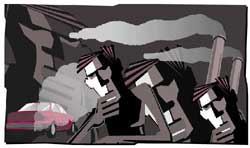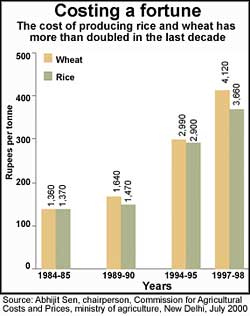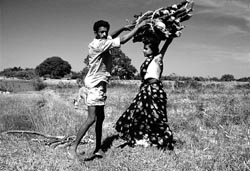India and the world population has doubled or tripled since the World War II. The world and India produces seven times more food than 60 or more years ago when many nations were in a shambles and farms were marred by mines and other hazardous chemicals in the aftermath of millions killed by bombs and gun battles, though not India, which was not a big theatre of war, but of the war of Independence. Imperial rulers were preoccupied with German and Japanese invaders and with conquering them. India was the fodder of the war machine with 2.5 million soldiers to fight on every front to defeat the Axis power. The war had seen the Bengal Famine with tens of thousands dying of hunger, but official records called it malnutrition, not starvation. That was the Imperial nomenclature, valid ever since until today. Yet in the bygone 20th century we have seen great strides, we have seen great visible progress in pursuit of Mahatma Gandhi's goal of wiping every tear from every Indian face. Irrigation dams by the score have been built and dry farms have had irrigation canals and channels supplying life-giving water. Where canals could not reach hand pumps or powered pumps have been installed to irrigate farms. Punjab, Haryana, western UP and many other States prospered, but not all areas. From 30 million tons of grain, India today produces as much as 210 million tons. For a long time, India was supposed to be self sufficient, not needing to import any grain, though for some years now, as part of the policy of food security a buffer stock has been built and wheat and rice have been imported. Sometimes exotic basmati rice has been exported and cheaper and large quantities of cheaper imported to try and feed Indians, but the exercise has not fully succeeded. In spite of the great Indian success story, when India's economy is one of the fastest growing at a clip of nine per cent per year why do we in free India, 40 per cent of us remain below the poverty line, sleep on an empty stomach, why 42 per cent of all children starve or are very poorly fed? Yet, literacy and education are fundamental rights, food is not. There are no free lunches, though midday school feeding programmes are much in place, yet honored more in the breach than in the observance, because 80 per cent of the money provided must be and is known to be siphoned off by the time it reaches the panchayat or the village or the city school into the pockets of all kinds of people, be they suppliers, petty or senior officials and politicians, down now to the village panch, leave alone the sarpanch. Is that the way of the Third World, if not all world, because corruption in the First Word is far more sophisticated; it runs into millions and billions of dollars, not in peanuts or a few rupees, hundreds or thousands of them. Such is the system, like it or not? Is that why 30 per cent growth some areas of the services sector and nine per cent overall, farm or grain production grows only at 2.6 per cent and in years of monsoon failure or excess of it, the growth is what in modern parlance is sophisticated jugglery of world negative as nobody wants to speak the truth that output has gone down or dropped. Management and official jargon has taken a new leap in falsehood and lies as truth is totally at a discount and invention and magic with words is the norm. That is Harvard or management school education, push the dirt under the rug, don't allow it to be exposed. Thanks to multinational producers and sellers of genetically modified seeds or biotechnology, salesmen push the hybrid seeds for well irrigated farms to grow more cotton whereas rainfed farms can take only ordinary seeds, cheaper and ten times costlier. At the time when farmers in Nagpur or Vidharbha and Andhra should be reaping a big crop, they find zero shoots. They have borrowed money to buy this costly seeds. They are deep in debt, of principal and interest. They have been cheated. Since they cannot afford to pay, the moneylender knocks at their men with musclemen in tow, throws them out of their hearth and home and occupies their parched farm. What does the poor farmer do now? He takes his life, next members of his family start doing the same. Thousands of farmers have been doing so for some decades now, although heartless money lenders have been doing this for centuries gone by. That is the story of Indian village, village after village. Now that a general election is less than 15 months away to choose a new Lok Sabha and three States in the north east are in the process to elect legislatures and six more States will do so before the end of the year or early next year, the Government is engaged in double quick time to line up doles for the voters, especially for the farmers, who are the backbone of a democracy, who hold the maximum number of cards. The magicians that the Prime Minister, his Finance Minister, and their boss, the Chairperson of the United Progressive Alliance are, have ordained that Rs.32,000 crores of buoyant government revenues must be dispensed with as debt relief to farmers to woo them for the grand old party. This is less than ten per cent of the bank loans of Rs.3,42,000 crores the farmers owe to the banks, but it is the government which will reimburse them so that they can balance their books and prudential banking does not receive a jolt. But the farmers at the mercy of private money lenders who charge 2 to 3 per cent are unlikely to benefit. Will they continue to die and starve as before? Only time will tell. God save them, for who else can? Lalit Sethi, NPA
















